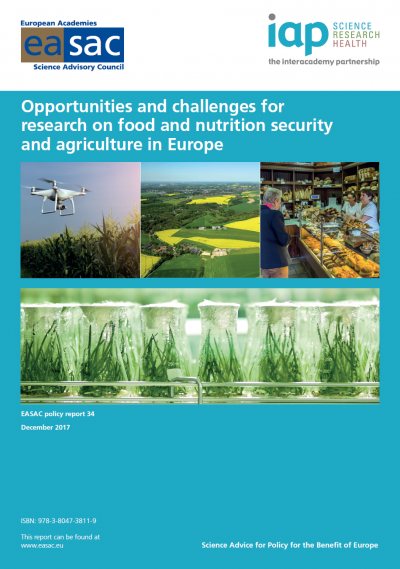


EASAC Press release
5 December 2017
New report from European science academies calls for urgent action on food and nutrition security: Europe will need to change its diet to address climate change and health
Scientists from national academies across Europe are calling for urgent action on food and nutrition in a new rigorous and independent report published today by the European Academies’ Science Advisory Council (EASAC). This thorough analysis has implications for policy-makers working on food, nutrition, health, the environment, climate change, and agriculture. Combating malnutrition in all its forms – undernutrition and micronutrient deficiencies as well as overweight and obesity – is a problem faced by all countries. Research and innovation will be central to finding solutions to these local-global and multidisciplinary, interconnected challenges. Evidence must underpin the policies that deliver Europe’s future approach to these issues. The report recommends being more ambitious in identifying and using scientific opportunities: how the current evidence base can shape understanding of both supply- and demand-side challenges, and how the research agenda should be defined, including basic research, to fill knowledge gaps.
Climate change will have negative impacts on food systems, necessitating the introduction of climate-smart agriculture such as the adoption of plant breeding innovations to cope with drought. Agriculture and current diets also contribute substantially to climate change. Mitigating this contribution depends on climate-smart food systems such as land-sparing and agronomic management practices together with efforts to influence consumer behaviours associated with excessive agricultural greenhouse gas emissions, including the overconsumption of calories and meat. Changing dietary consumption could bring co-benefits to health and to climate change.
Top line findings by the panel of scientists include:
Food consumption will need to change to improve consumer health:
Farming and agriculture have significant impacts on human health and the environment:
Europe should not stall on opportunities offered by genome editing, precision agriculture and the use of large data sets:
Underpinning all of the scientists’ recommendations is a clear call to integrate research and innovation into all of these topics, where many questions remain from a scientific perspective. An evidence-based food systems approach that integrates all of these issues is recommended. Europe must capitalise on opportunities to co-design research across disciplines to understand better the nexus food-water-other ecosystem services and to inform the better coordination of relevant policy instruments, including the Common Agricultural Policy, Water Framework Directive and the Habitats Directive. Efforts to increase food systems’ efficiency should not focus on increasing agricultural productivity by ignoring environmental costs.
Notes for editors:
This report is a part of a global project led by the InterAcademy Partnership and will be joined by three complementary reports focusing on the Americas, Africa, and Asia which will be published in the first quarter of 2018. This global project has been supported by 130 science academies around the globe in an unprecedented effort to bring together the latest knowledge on the future of food, health, and the environment. The global comparative report will be published in mid-2018. The IAP project is distinctive and adds value to the large body of work already undertaken by many other groups.
This project was formulated so as to stimulate the four regional networks in diverse analysis and synthesis according to their own experience, traditions and established policy priorities, while, at the same time, conforming to shared academy standards for clear linkage to the evidence available. The project as a whole and in its regional parts was also underpinned by necessary quality assessment and control, particularly through peer review procedures. The networks of science academies involved in the project are grateful for the financial support provided by German Federal Ministry of Education and Research (BMBF).
Read the report here.